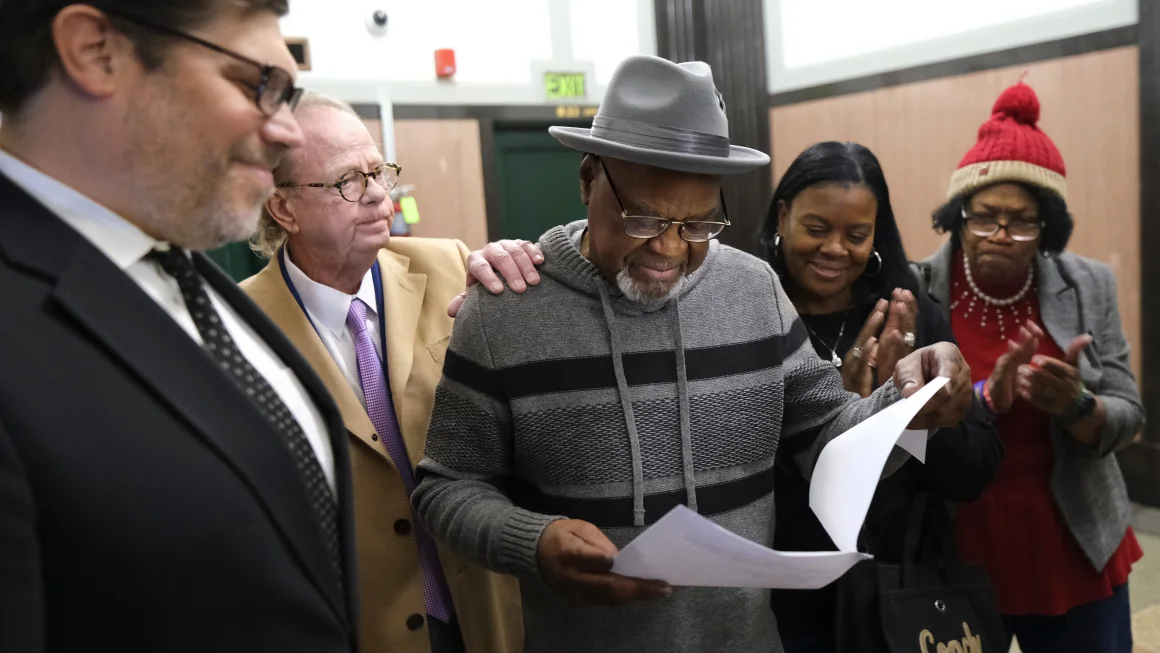the incredible story of Glynn Simmons, who, after an agonizing 48 years in prison for a crime he did not commit, has been declared innocent—a record for the longest wrongful incarceration in the United States. Dive into the legal twists, the judge’s decisive declaration, and the challenges Simmons faces, including a battle for compensation and a GoFundMe campaign for support during his battle with stage four cancer. This is a tale of resilience, justice served, and the ongoing fight for redemption.
In a historic turn of events, Glynn Simmons, 70, has been declared innocent by an Oklahoma judge after spending an astonishing 48 years in prison for a crime he did not commit. This wrongful incarceration is believed to be the longest served by any exoneree in the United States. The journey towards justice for Simmons has been one of resilience, legal scrutiny, and finally, redemption.
Glynn Simmons
The Long-Awaited Declaration:
The declaration of innocence came on Tuesday in an Oklahoma County District Court hearing. Glynn Simmons expressed his relief and happiness, stating, “This is a day we’ve been waiting on for a long, long time. It finally came.” This verdict brings a sense of closure to a chapter that has lasted nearly half a century.

A disturbing record:
Simmons’ case stands out tragically, as he served 48 years, one month, and 18 days, earning him the unfortunate distinction of the longest wrongful incarceration in the history of the United States, as recorded by the National Registry of Exonerations. The average duration of wrongful incarcerations, according to the registry, is just over nine years, underscoring the severity of Simmons’ ordeal.
Legal Battle and Triumph:
Simmons’ legal battle gained momentum when he was released on bond in July. The judge vacated the 1975 judgment and sentence after evidence was found to have been withheld from his defense attorneys—a violation known as the Brady violation. District Attorney Vicki Behenna, in a commendable move, announced in September that there would be no retrial, citing a lack of physical evidence.
Judge Amy Palumbo’s Declaration:
The formal declaration of innocence came through Judge Amy Palumbo’s amended order, stating, “This Court finds by clear and convincing evidence that the offense for which Mr. Simmons was convicted, sentenced, and imprisoned in the case at hand, including any lesser included offenses, was not committed by Mr. Simmons.” This conclusive statement marks the end of a protracted legal battle for justice.
The Troubling Past:
Simmons, at the age of 22, was initially convicted alongside another man for the murder of Carolyn Sue Rogers during a liquor store robbery on December 30, 1974. The prosecution’s case relied heavily on the testimony of an 18-year-old witness who, over time, had identified Simmons and his co-defendant through a flawed lineup process. Simmons consistently maintained his innocence, stating that he was not even in Oklahoma at the time of the robbery.
Legal Hurdles and Redemption:
Despite Simmons’ testimony and corroborating witnesses placing him in Louisiana during the alleged crime, he was sentenced to death and later commuted to life in prison due to a Supreme Court ruling. His co-defendant was released on parole in 2008, while Simmons continued to endure the hardships of prison life.
Compensation and Future Challenges:
Now officially declared innocent, Simmons and his legal team are pursuing compensation for the wrongful years he spent behind bars. Oklahoma law limits compensation to $175,000, and while this process has begun, there are no guarantees, and further legal battles may be necessary.
Current Challenges and a Call for Support:
Simmons, now 70 and diagnosed with stage four cancer, faces financial hardships and is seeking assistance through a GoFundMe campaign. The limitations of his incarceration prevented him from acquiring skills for gainful employment, making external support crucial for his well-being.
Glynn Simmons’ exoneration after 48 years serves as a poignant reminder of the flaws within the justice system and the resilience of those who endure wrongful imprisonment. As the legal battle for compensation unfolds, Simmons hopes for a brighter future after a lifetime marked by injustice and hardship.
